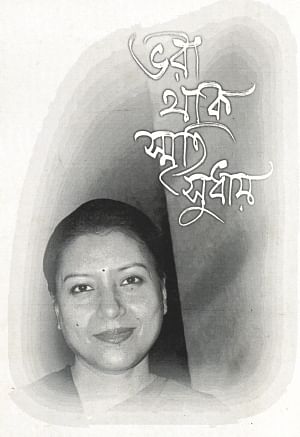| Home - Back Issues - The Team - Contact Us |
 |
| Volume 11 |Issue 28| July 13, 2012 | |
|
|
Remembrance Sitara Parveen . . . in flourishes of poetry Syed Badrul Ahsan It has been more than seven years since I last spoke to my good friend Sitara Parveen. These days, every time I remember her, it is an old image of her that comes alive. There she is, in the corridors of the English department at Dhaka University, her long tresses and her dusky complexion making her a portrait of perfect Bengali womanhood. It was a time when I did not know her. At one point, she finished her studies in the English department and then moved on to the department of journalism, where she eventually became a teacher. It was when she was chairperson of the journalism department at Dhaka University that I became acquainted with her and with her husband, Professor Ahaduzzaman. Ah, but let me note here that my entry into journalism was facilitated by the fact that Ahaduzzaman left the New Nation, where he had been working as assistant editor, to join the department of journalism as a teacher in the early 1980s. I was offered his place at the New Nation. And I took it.
When I met Sitara Parveen towards the end of 1996, there was a clear reason behind it. She wanted me to conduct a few classes, on a part time basis, for students of journalism. I was only too happy to do that and for the next three months or so it was a huge pleasure interacting with the young who came to study journalism and media communication at Dhaka University. The sad part of the story is that I could not continue beyond three months because of a diplomatic position I needed to take up at the Bangladesh high commission in London. But that did not in any way lead to a snapping of my links with Sitara Parveen. She turned up in the United Kingdom at a point in the middle of my three-year assignment and I was too happy to play host to her. It was at King's Cross station that I waited for her, all the while expecting a Bengali woman draped in a sari to emerge from one of the trains pulling into the platform. I went on looking, unaware that a woman in modern western attire was right there beside me. It was Sitara, smiling away, saying nothing. On the way to my residence with her, I worried about the poor state of hospitality I would be providing for her. My wife Zakia was away in Paris on a brief holiday and would not be back until the evening of the next day. In the car, we talked about the country, about how her father, the eminently respectable Justice Shahabuddin Ahmed, was coping with the nation's presidency. Once home, I pottered about in the kitchen trying to fix something for her. I had never cooked in my life (and I have not so far). It was Sitara Parveen who helped me out of my predicament. She took charge of the kitchen, had the food in the refrigerator warmed, with some new curry to go with it. It was, I might add, a very literary dinner, in that fictional sense of the term, that we had. The conversation was very English, very polite and yet very warm. When my wife turned up the next day, it was a celebration all three of us went into conversation and laughter took over in all their spontaneity. In the few days Sitara Parveen stayed in London, she visited a good number of places, especially in the East End, with me. She was, after all, busy researching certain aspects of the lives of expatriate Bengalis in Britain. On a bright sunny morning, she and I met up with the poet Shamim Azad in a restaurant over warm, soothing coffee. We talked long and serious. Sitara asked the questions, to which Shamim provided the answers. And Sitara took copious notes. During her stay in London, I had her visit the high commission. Her humility and shyness had a very positive effect on everyone who came to say hello to her in my office. Here was the daughter of Bangladesh's president, with none of the hauteur which assails the children of the powerful in the underdeveloped world. I do recall that one of the most senior of diplomats at the high commission, introduced to Sitara, said a cursory hello to her. In the evening, when he came to know that she was President Shahabuddin's daughter, he and his wife went overboard trying to invite her to dinner at their home. To my intense pleasure, Sitara politely declined the invitation. And smiled, in that tranquil way of hers, as she put the phone down. At the end of Sitara's visit to London, as twilight took over, Zakia and I accompanied her to Cambridge, where she planned to stay with her younger sister for a while. It was a cool ride, the three of us speaking of music and poetry and watching the changing colours of the sky, as we drove down to Cambridge. A couple of hours later, her face bathed in light, Sitara Parveen bade us goodbye. There was something of the wistful in her as she watched us move away. Seven years after her life came to a sad, sudden end in distant America, Sitara Parveen remains a soul painted in the suave flourishes of poetry. She remains astral, across the nocturnal skies.
The writer is Executive Editor, The Daily Star. |
||||
Copyright
(R) thedailystar.net 2012 |
